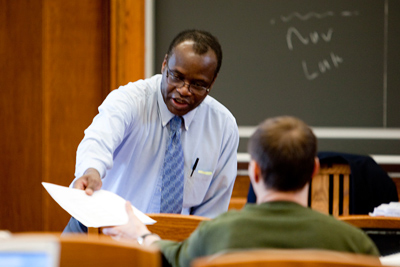Law students help further Somalia's political reform
By George Lowery

Somalia has been engaged in conflict since 1980, when the country descended into civil war following a military coup. But a breakthrough agreement to end conflict in Somalia was reached at a February conference under the auspices of the United Nations Political Office for Somalia with input from a Cornell Law School professor and his students.
Somali leaders adopted the Garowe Principles to guide the transition process to a federal parliamentary form of government. U.N. Secretary-General Ban Ki-moon welcomed the agreement, noting that the accord "sets out clear steps for ending the transition and putting in place a constitutional order."
Cornell Law School Professor Muna Ndulo, who serves as a U.N. consultant to the Somali process, engaged five of his law students to research and write presentations on such subjects as electoral systems, transition arrangements and regulation of political parties and political party funding.
The students' work supported the negotiations for the Garowe II Principles of peace, security and reconciliation adopted Feb. 17. Somalia's current transitional government, installed by the international community as an interim entity, is scheduled to evolve into a permanent government Aug. 20, Ndulo said. For that to happen, a new constitution must be drafted and agreed upon to replace Somalia's 1960 constitution.
"You're trying to establish a democratic government, and the basic tenets of a democratic system include human rights, free elections and an elected government," said Ndulo, who directs Cornell's Institute for African Development. "The U.N. is encouraging dialogue among the Somali people and helping them to build national support for these changes. I have participated in the meetings, and my presentations at the meetings were informed by the work my students did."
The goal of the process is to draft a new constitution acceptable to all parties. But moving from conflict and chaos to constitutional government raises many challenges, such as what system of government, what type of federal structure and electoral system Somalia will adopt.
"The students really are having a role in history," said Ndulo. "Their work is very significant, and the U.N. acknowledged their contribution to the process."
Ian Brekke, a second-year law student, wrote a comparative look at constitutional regulation of political parties.
"The report I prepared ended up in the hands of the U.N. Development Programme and is being used as reference in current and future negotiations in Somalia," Brekke said. "The chance to dive into such meaningful and pertinent research under Professor Ndulo has exposed for me many of the complexities of constitutional negotiations, especially negotiations that take place in the unique circumstances Somalia and its people find themselves in."
Third-year student Ann Eisenberg said she "researched post-conflict election guidelines and learned quite a bit throughout about the challenging process of nation-building."
Other law students working with Ndulo were Bill Garthwaite, Genevieve Ballinger and Patrick Meson.
The international community will need to support and help Somalia to emerge from decades of crisis, Ndulo said. Work there "is ongoing. I am very proud of my students and their contributions. They are very committed to internationalism and to helping the world. In resolving conflicts you can't succeed simply with force. You need dialogue and open channels of communication to solve problems."
Media Contact
Get Cornell news delivered right to your inbox.
Subscribe